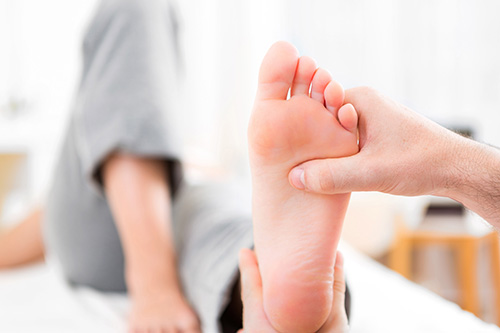
06 Jul Stubborn Plantar Wart?

Plantar warts are caused by the Human Papilloma Virus (HPV) and cause a hard and often painful thickened lesion on the sole of the foot. Plantar warts occur in all age groups but are very common in children due to their immature immune system. Plantar warts are not a serious health threat and can sometimes spontaneously resolve without treatment. However sometimes they require treatment to stimulate healing. Often in adults plantar warts can be stubborn and only respond to the most aggressive treatment methods. Children who suffer from plantar warts will often see them spontaneously resolve after 12-18 months. So unless they are causing discomfort we often delay treatment until such time has passed.
Warts should be treated if:
- they look to be spreading
- if the look of them is unsightly for the patient
- if they are painful to walk on
Excluding surgical excision any treatment for plantar warts is aimed at stimulating the bodies immune response to fight the viral cells. Surgical excision is typically a last resort as it has the potential to cause permanent scaring that can be painful due to being on the bottom of the foot. Treatment options range from natural creams and pastes to more aggressive acids. Cryotherapy is another commonly used method – it involves using liquid nitrogen to freeze the wart tissue which deprives it of a blood supply. When dealing with multiple warty lesion we recommend a needling/puncturing technique which is performed under a local anaesthetic. This treatment breaks attempts to have the bodies own immune system fight off the wart tissue and has been shown to be very successful with stubborn warts. When dealing with plantar warts it is very important the overlying callous is removed so that the treatment applied can penetrate the wart tissue, this is the reason it is best to have a podiatrist treat your wart as they are highly trained in removing the callous and providing the most suitable treatment application.
The following tips may help to prevent plantar warts:
- Avoid walking barefoot in public changing rooms
- Change shoes and socks daily
- Keep feet clean and dry
- Ensure any cuts or scratches are attended to as this could be a portal for the virus
- Bleach or thoroughly clean communal showers at home to prevent the spread to other family members
- Monitor feet for any lesions and seek treatment immediately should you find anything unsightly
For further advice bookings can be made through our website www.basepodiatry.com.au
Mount Eliza 1300 776 055
Frankston 03 8707 0830
Cheltenham 03 9583 4000
